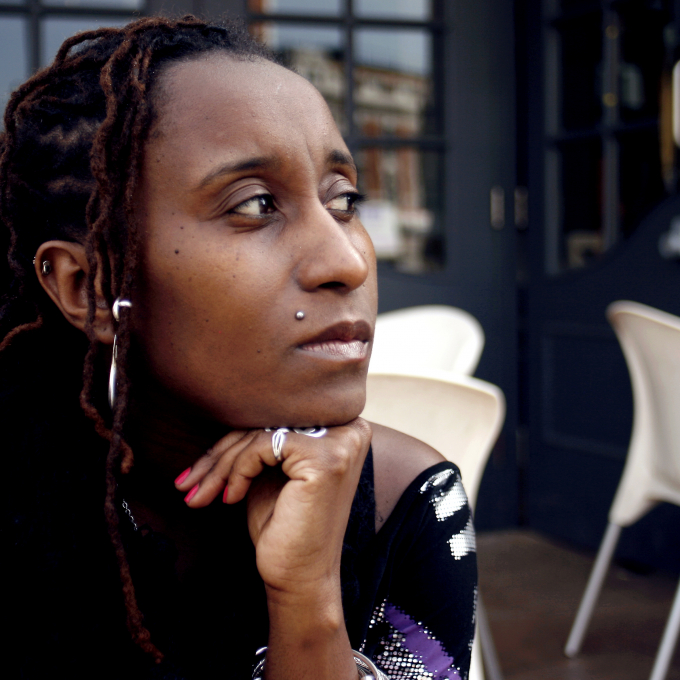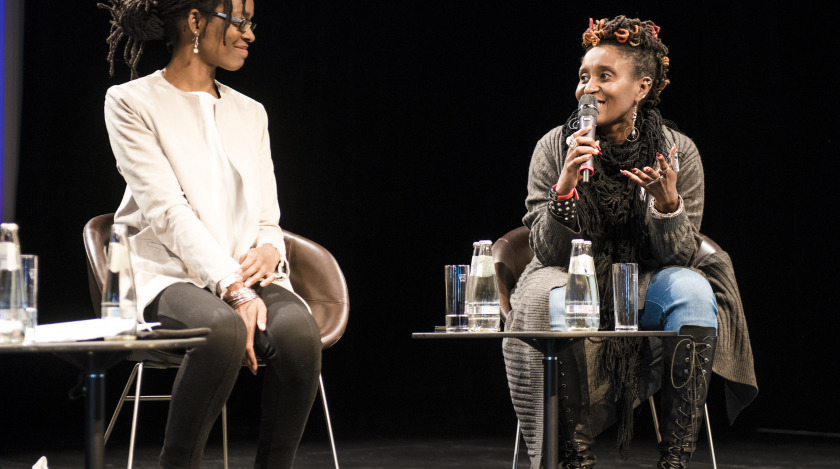
Biography
Malika Booker is a writer, spoken word and multidisciplinary artist, whose work spans literature, education and cross-arts. Organisations she has worked with include Arts Council England, BBC, British Council, Wellcome Trust, National Theatre, Royal Shakespeare Company, Arvon, and Hampton Court Palace.
She has appeared worldwide both independently and with the British Council. She was one of the touring poets with Bittersweet in 1999/2000 and since has featured in the spoken word project, Modern Love, and in Kin at the Barbican in 2004 - a show incorporating words, music and visuals. She was commissioned to co-produce a poetry film to commemorate the Royal Festival Hall's 50th Birthday Celebrations in 2001. Her first musical play, Catwalk, commissioned by NITRO, ran at the Tricycle Theatre in June 2001 and had a successful UK tour. She was Hampton Court Palace writer in residence in 2004. In 2005 she undertook a two-month writer fellowship in Delhi, to work on her first novel. She is an experienced creative writing course leader and has run courses for various organisations including The Arvon Foundation, National Theatre and the Young Vic. She worked with young people for the Inner-London Teenager Poetry Slam in 2003 and 2004, which resulted in two collections of their writing, Where I'm From, Where I'm Going and The Way We See It, The Way It Is. Booker also ran 'Malika's Kitchen', a writers' collective based in London and Chicago.
The play Unplanned, opened in Spring 2007, with a run at Battersea Arts Centre. Her book, Breadfruit, was published in 2007. Her latest poetry collection is Pepper Seed, published by Peepal Tree Press in 2013. In 2017 she was shortlisted for the Forward Prize for Best Single Poem.
In 2019 Booker received the Cholmondeley Award for her outstanding contribution to poetry.
Critical perspective
Where Toni Morrison famously spoke of the ‘ancestor as foundation’, the manifold voices of Malika Booker’s poetry often yearn for what the former called ‘rootedness’ in familial and sexual relations. What Booker (who counts Morrison among her influences) shares with Morrison is an enduring concern with childhood trauma, which figures repeatedly in the work of both artists in the image of the wounded body.
The opening poems of Booker’s first major volume, Pepper Seed, explore barbed, casual acts of violence that cut across the ancestral bonds of gender and generation. These are pieces that make the most of poetry’s capacity for exploring the unspeakable and the taboo. In ‘Pepper Sauce’ for example, what at first appears a cosy domestic ritual in which a child helps her grandmother prepare food, emerges as a brutal act of physical punishment. It is a poem that stays with the reader long after reading it. In ‘Granny’s Love Poems’ and ‘Red Ants Bite’ the speaker articulates the longing for the unconditional love of her ‘granny’:
'I tried to make her love me,
But her mouth was brutal,
Like hard-wire brush, it scraped me,
Took skin off my bones, made me bleed
Where no one could see…'
The visceral subjects of these brave confessional pieces cast a long shadow over the experiences of desire and sexual encounter explored elsewhere in Booker’s work. In her earlier pamphlet, Breadfruit (2007), a poem called ‘Clasped’ describes the speaker passionately embracing a lover with all the inappropriateness of a ‘child hugging an adult’. Like the clasp of the bracelet he has bought her, their relationship ends ‘broken beyond repair’. Another poem of betrayal, ‘Stale’, describes an anti-climactic moment of (self-) discovery, and a once passionate relationship ‘gone sour’. ‘Erasure’, meanwhile, dwells on the trauma of abortion as the return of the repressed: ‘here was no grief. You are my silence./ Why do you choose to rise now like shifting sand/blown by a slight breeze?’.
Elsewhere, Booker’s poems move easily between early nineteenth century Grenada (‘Death of an Overseer’; ‘Minetta Speaks’) and contemporary London, between standard English and the vernacular voice. The Notting Hill carnival, meanwhile, joyfully and affectionately reaffirms the bonds between past and present, young and old, innocence and experience:
'Those old hips shake your pleated skirt today, aunty.
You are no church girl. All day you jamming
Behind big truck, laughing, bottom rolling for so,
Feet chipping, skirt swaying as if for its blasted self'
Food, which carries associations of pain and discipline in ‘Pepper Sauce’, is steeped in more positive memories in poems like ‘Saltfish’, or ‘Brixton Market’. In the latter, the young speaker blindly follows her mother as she weaves through the market stalls, expertly testing the okra as she does the tinned goods of the convenience store:
'At Kwik Save, each can of baked beans
Was vetted for dents, each egg
Delicately lifted, searched for cracks.
I would learn that this is how my grandmother
taught her, kneeling in the bush uprooting dasheen'
These secular vignettes of everyday life in London are rarely far from the sacred sounds of gospel, rosaries and Old Testament violence. In Pepper Seed for instance, poems are organised around sections such as ‘Testament’, ‘Lamentations’ and ‘Alters’ while individual poems carry titles such as ‘Exodus’, ‘Prayer’ ‘Sin Visits Me’ ‘Vigil’, ‘Faith’, ‘Libation’ ‘Gratitude’ ‘Our Last Supper’.
But Booker ultimately seeks solace in poetry rather than psalms. The collection’s epilogue is a line taken from the Haitian writer Edwidge Danticat. It captures the links and bonds between mothers, daughters and granddaughters that seemed broken at the book’s beginning: ‘The women in your family have never lost touch with one another’, the italicised text insists. It is a sentiment both reinforced and unsettled by the unexpected, unsentimental poem that follows it, ‘My Mother’s Blues’:
'Yes, my mother knows pain.
My children don’t call,
do they still love me pain,
a worrysome dying grey hair black,
children too far away pain…'
The collection’s contrary images of beauty and the unhomely, innocence, decay and death are captured poignantly in ‘Suicides’, a poem which appears immediately before the epilogue:
'My room is an orange graveyard.
Ladybirds come here to die,
each day a new corpse.
They rest their polka-dot frocks
on my rotting window frame;
outside the world also dies;
black clouds drift;'
The polka-dot frocks of the ladybird sit symmetrically against the image of biting red ants with which the book opened, mirroring contrary associations. But suicide in Booker’s poetry is less an idea escape, or even ending, than of claustrophobic confinement. In her early poem ‘Hungerford Bridge’ (published in Breadfruit) the image of a ballooning, scissoring, striding figure falling fatally into the Thames is counterpointed, disconcertingly, with the speaker trapped inside her own body:
'On sweltering nights, hay fever attacks;
I awake starved of wind, oxygen scarce,
listless, clogged up by a sticky cork, gasping,
gaping mouth working like a fish,
my tongue coated with white spots
where my mouth attempted to keep me alive.'
Yet abuse, abortion, even suicide, are no simple tropes of despair and victimhood in Booker’s work. As her tragi-comic one woman show, Unplanned and her specially commissioned monodrama Absolution demonstrate, Booker’s is a voice characterised by resilience and the resources of laughter and love. Counterpointing the darker themes of violence, death and disappointment that punctuate all of Booker’s poetry to date, we discover equally enduring celebrations of the poet’s diasporic inheritance. As W.N. Herbert writes ‘The formal ground of her work is at once narrative and rhapsodic … both familial and genealogical … she draws deeply on her own experience and memories in order to make that leap into the historical imagination which marks out any distinctive voice.’
James Proctor, 2017
Bibliography
Awards
Author statement
Writing is the best way to engage the imagination, to create magic, change the world. I write because my mother tells me I am the first generation of women to be able to tell our stories and because I know there are women in the world who cannot speak. I write to make sense of life, to make the ordinary extraordinary. I write to tell stories, our stories. But most importantly, I write because I cannot do anything else. If I am not writing, then I am not breathing.


